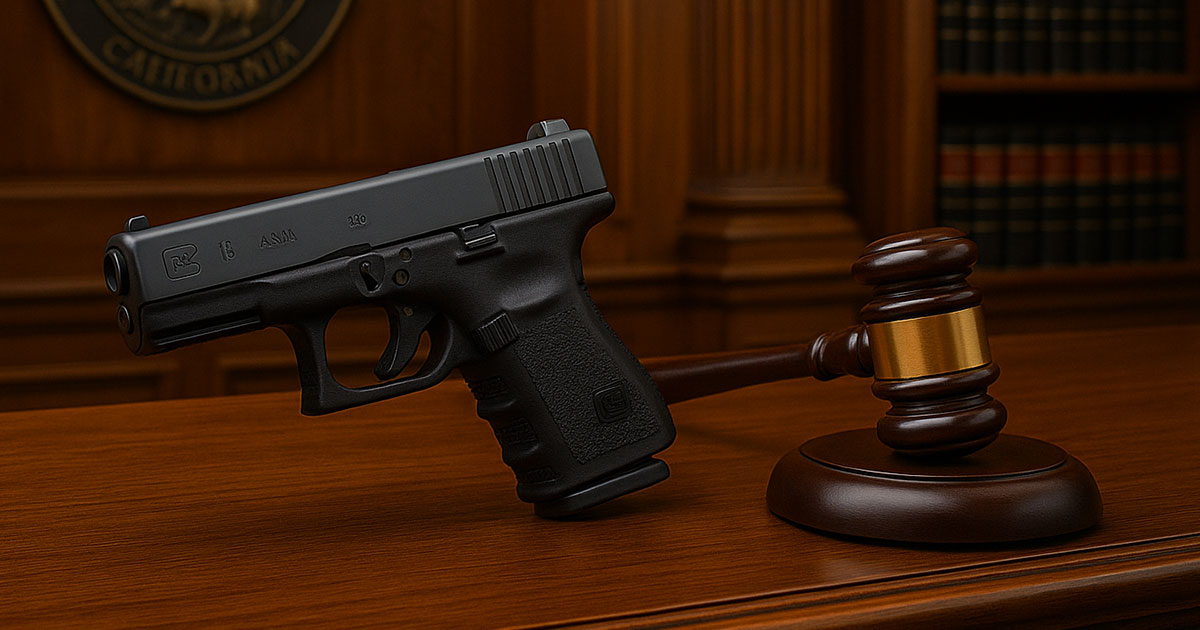SAN DIEGO, CA — Less than a week after Governor Gavin Newsom signed AB 1127 into law — effectively banning the sale of most Glock pistols in California — a coalition of gun rights organizations has filed a federal lawsuit challenging the new statute as unconstitutional.
The lawsuit, Jaymes v. Bonta, was filed October 13 in the U.S. District Court for the Southern District of California. Plaintiffs include the Second Amendment Foundation (SAF), National Rifle Association (NRA), Firearms Policy Coalition (FPC), a licensed firearms dealer, and two individual California residents.
At issue is California Penal Code § 27595(a), the provision created by AB 1127, which bans the sale of any semiautomatic pistol with a cruciform trigger bar that can be “readily converted” into a machine gun using a device like a Glock switch — already illegal under federal and state law.
“These handguns are in common use; indeed, they are among the most popular firearms in the nation,” the complaint states. “Yet if § 27595(a) is enforced, Californians will have no practical way to acquire them. That is flagrantly unconstitutional.”
The lawsuit argues that Glock handguns — and others like them — are explicitly protected by the Second Amendment, citing District of Columbia v. Heller, where the Supreme Court held that handguns are “the quintessential self-defense weapon” and cannot be banned from lawful possession.
“Just as we’ve done in numerous other cases in the state, we will vigorously defend this unconstitutional infringement on the Second Amendment rights of Californians,” said SAF founder Alan Gottlieb. “Lawmakers in the state obviously don’t understand that the Second Amendment is not a second-class right.”
AB 1127: A Targeted Ban on the Most Popular Handgun
The new law, signed by Governor Newsom on October 10, bans the sale, offer, or transfer of any pistol that meets the bill’s definition of a “semiautomatic machinegun-convertible pistol.” That definition includes:
- Semiautomatic pistols with cruciform trigger bars
- That can be converted to full-auto using a “pistol converter” device
- Without any machining or modification of the internal mechanism
While no brands are named in the law, the criteria specifically describe the Glock platform, including the Glock 19 — the same model previously carried by Vice President Kamala Harris while serving as California’s Attorney General.
Under AB 1127, law-abiding citizens will be prohibited from purchasing new Glock handguns from licensed dealers in California beginning July 1, 2026. You can read a full breakdown of the law and its implications here in our original report.
Legal Challenge: “In Common Use” and Protected by the Second Amendment
The plaintiffs argue that banning the sale of firearms in common use — even if the state claims they are convertible — violates the core holding of Heller and Bruen. In support of their case, the complaint cites:
- Over 500,000 Glock pistols manufactured in the U.S. in 2021
- Hundreds of thousands more imported from Austria
- ATF statements acknowledging Glock’s popularity among civilians
They further note that California is already under court scrutiny for its restrictive handgun roster, referencing the Renna v. Bonta case, where the court questioned the constitutionality of California’s bans on newer handgun models.
“Rather than heed the demands of the Second Amendment and their own courts, California lawmakers have responded by doubling down and expanding their handgun ban,” said SAF’s Bill Sack.
The lawsuit seeks both declaratory and injunctive relief, aiming to block enforcement of the ban before it takes effect.
What’s Next?
The case is now pending in federal court, and could have implications well beyond AB 1127. If the plaintiffs are successful, the ruling could limit how far states can go in banning firearms based on design characteristics — especially when those firearms are already widely owned and lawfully used.
Given the national popularity of Glock pistols and the strength of recent Second Amendment precedent, this challenge is likely to draw significant legal and political attention in the months ahead.
For now, the message from California lawmakers appears clear: even if a firearm is legal to own, legal to carry, and legal under federal law — if it’s a Glock, they don’t want it sold.
Read full article here


